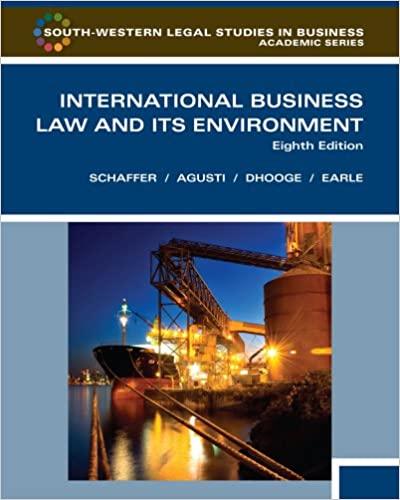Answered step by step
Verified Expert Solution
Question
1 Approved Answer
A director in a limited company which does construction work cannot be held personally liable for faulty construction work that s/he performs. A single person
- A director in a limited company which does construction work cannot be held personally liable for faulty construction work that s/he performs.
- A single person cannot own all the shares of a limited company
- Partners in firms typically take out professional indemnity insurance policies against the risk of giving negligent advice known as D&O [directors & officers] insurance
- If land under the Torrens system is sold, it has a new owner when the Register is altered, not earlierwhen the purchase price is paid to the existing owner
- To determine in court whether there was an 'intention to create legal relations' between negotiating parties the court has to decide what the actual intention of the parties was, a subjective test
- It does not necessarily follow that if one party to an agreement has used its economic position to persuade the other party to agree to less than ideal terms, that the agreement is unenforceable
- If a party is in breach of a contract by not doing what the party agreed to do under the contract, then unless that party can correct the breach, that party is liable to pay the other party damages being being money to compensate them for the harm or loss caused by that breach
- If an agreement is made between two parties in which one party will pay money for the other party's performance of its obligations, it must be a legally enforceable contract
- The need for consideration to form a legally binding contract is a creation of the Common Lawsystem but is not a requirement of the Civil Law system
- Under the 'postal rule' an offer is accepted when the letter of acceptance is committed to the postal system is before the offeror received the letter of acceptance, or even saw it
- Certain elements are common to all contracts but a lot of contracts by reason of frequent andrepetitive use develop specific features, and specific legislation covers construction contracts
- A builder agreed to make extensive renovations and structural alterations to a homeowner's house and they both agreed not to apply to the consenting authority for a building consent as it was unlikelythat one would be given; this was still a legally binding contract if a price for the work had beenagreed because parties are free to enter into any agreement for any price they agree to
- A typical prescriptive specification cannot contain performance based requirements
- Manufacturers' literature cannot be used as contract documents because of copyright issues
- In the 'traditional' form of contract the owner employs a designer* under one contract, and the owner employs a builder under a separate contract to follow the designer's drawings and specifications the designer is often an architectural practice which employs specialists e.g. structural designer etc.
Please help judge whether these questions are true or false
Step by Step Solution
There are 3 Steps involved in it
Step: 1

Get Instant Access to Expert-Tailored Solutions
See step-by-step solutions with expert insights and AI powered tools for academic success
Step: 2

Step: 3

Ace Your Homework with AI
Get the answers you need in no time with our AI-driven, step-by-step assistance
Get Started


